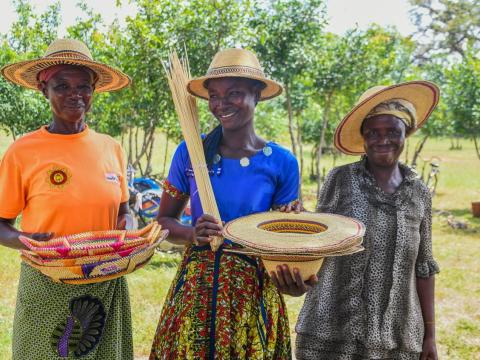Reviving Roots: FMNR Restores the Environment, Boosts Traditional Crafts and Empowers Women

By Francis Npong
In Nyongo and neighbouring villages in Ghana’s Upper East region, pottery and weaving are more than just arts, they are essential livelihoods for women and girls. Yet, over time, relentless deforestation and bush burning have stripped the landscape of the natural resources vital to these crafts.
As weaving grasses dwindled, clay became harder to find. The vibrant colours of their handiwork began to fade, and the artisans felt the strain. The community feared that their cherished traditions and their income were slipping away.
But hope returned when World Vision Ghana introduced the Farmer Managed Natural Regeneration (FMNR) initiative.
This innovative land restoration programme revived the degraded landscape, revived traditional crafts, and created new economic opportunities for women across Nyongo and beyond.
“Our weaving grasses, termite hills, and firewood are now right at our doorsteps thanks to FMNR. People from near and far are seeking out our baskets and pottery," said Elizabeth Atinga, a basket weaver.
Today, the women of Nyongo are celebrated for their intricate pottery, baskets and woven hats.
Their revived crafts now generate a stable income, helping to support their families and empowering them to preserve their heritage. "Weaving and pot making are our livelihoods," Elizabeth said proudly.
Prior to FMNR's environmental restoration, these traditional crafts were in danger of disappearing, forcing young people to migrate to the cities in search of work and leaving older women without meaningful activities, especially during the dry season.
"Now our young people no longer migrate, and our older women stay engaged and productive," she added.
This transformative change began with FMNR, a low-cost technique that improves environmental resilience and increases food and timber production by managing the natural regrowth of vegetation.
By nurturing stumps, roots, and seeds, FMNR restores soil structure, prevents erosion, improves water retention, and supports biodiversity making once-scarce resources abundant again.
Elizabeth and fellow artisans like Mary shared their enthusiasm with World Vision partners from Germany, France, Switzerland, and Australia during a recent tour of the FMNR project sites in Kessana Nankana.
The partners saw first-hand how FMNR links environmental health with economic empowerment, traditional crafts and community resilience.
Together, these artisans are weaving a story of resilience, preserving their heritage, and building a sustainable livelihoods one basket, pot, and woven hat at a time.